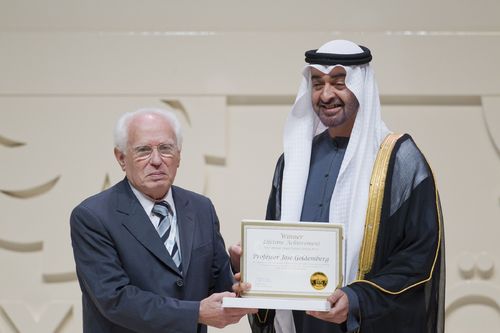São Paulo – Brazilian physicist José Goldemberg should share his knowledge and experience in renewable energy with the United Arab Emirates. In January, he received the Zayed Future Energy Prize for Life Achievement and plans to return to the country next year to learn more about and to provide contributions to Masdar, the sustainable city project in Abu Dhabi.
The award is organized by Masdar and was created by the crown prince of Abu Dhabi and deputy commander of the Armed Forces of the Emirates, Mohammed Bin Zayed Al Nahyan. Goldemberg, who has already occupied several public positions, was chosen for his career works.
The research by the physicist identified the viability of replacing petrol for ethanol and the advantages of production of the fuel from sugarcane as against maize. Sugarcane ethanol, showed Goldemberg, is more beneficial to eh environment, as it is possible to use the bagasse for generation of energy, while maize depends on electricity for processing.
The researcher’s current works are more turned to the political side, showing that developing countries do not need to cross the fossil energy or coal phase, as did the European nations, and suggesting that they move straight to renewable fuels for their growth process. The press in the Emirates called him “pioneer in biofuels”.
Zayed Future Energy Prize was established by the crown prince to celebrate his father, Zayed Bin Sultan Al Nahyan, founder of the Emirates – who passed away in 2004 -, for his environmental work. “He was very much learned. When oil was discovered in Abu Dhabi, some 70 years ago, he immediately noticed that he had to care for the future, realising that these resources are finite and that it was necessary to think about the future,” said Goldemberg.
Masdar is in Abu Dhabi, a city designed for sustainability, with solar energy, reuse of water, urbanism for lower consumption of energy and non-polluting transport, among other improvements.
The award, apart from a personality who contributed to the environment, also nominates a large corporation, a small or medium company, a non-governmental organisation and schools with work in this respect. Goldemberg stated that he has never had much contact with the Arab world. He was a professor abroad, at the University of Paris, France, and Princeton, in the United States, among others, but never developed similar work in the region. “I visited Egypt and Jordan to participate in congresses,” he said. The physicist, however, shows admiration for the concern of Abu Dhabi with sustainability and says that a sustainable energy alternative for the Gulf countries would be production in Muslim countries in Africa.
Goldemberg was the only honoured personality speaking during the ceremony in which the award was granted, in the presence of personalities like Queen Rania, of Jordan. At the event, he said that the homage was more than personal, but was recognition of the fact that the use of biomass as a source of energy is one of the routes to the future.
In the same trip, the physicist spoke at the World Future Energy Summit, from January 15th to 17th, in Abu Dhabi. Goldemberg stated that in his contact with professionals in the region, he noticed a very high educational level.
Goldemberg is currently a researcher and professor at the Energy and Environment Institute at the University of São Paulo (USP), where he sponsors post-graduate students. He is a doctor in Physics from USP, of which he was the president from 1986 to 1990, and has already occupied posts like that of Environment secretary and Science and Technology secretary for the Presidency of the Republic, minister of Education, president of the São Paulo Energy Company (Cesp), president of the Brazilian Society for Progress of Science as well as Environment Secretary for the state of São Paulo. Goldemberg was selected as one of the Time magazine’s thirteen Heroes of the Environment, in the Leaders & Visionaries category, in 2007, and received the “Blue Planet Prize 2008”, granted by Asahi Glass Foundation.
*Translated by Mark Ament




